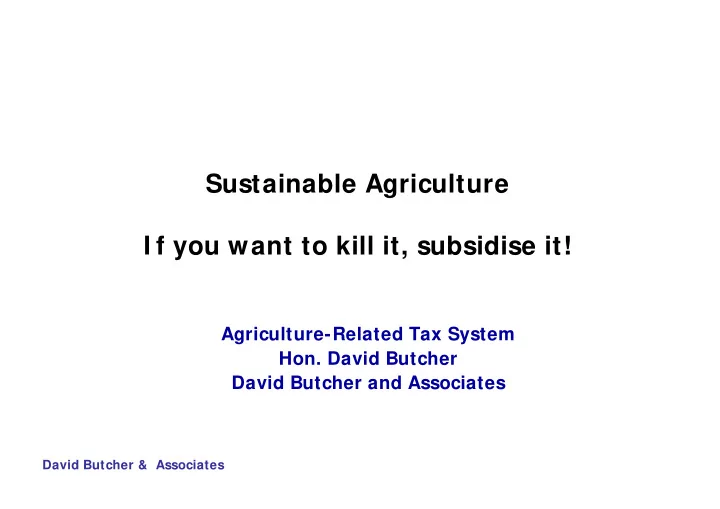

Sustainable Agriculture I f you want to kill it, subsidise it! Agriculture-Related Tax System Hon. David Butcher David Butcher and Associates David Butcher & Associates
New Zealand • developed country but agriculture the main export • depression in the 1930s, mass unemployment, • From 1935 stimulated economy, but ran out of foreign currency, • Import quotas imposed, • Government controls and managed trade until ’80s . David Butcher & Associates
Relative Decline • Relative Decline – at the height of the country's prosperity in the 1950s, a 30-year decline began. – the decline at first was relative. New Zealand was growing, other countries were growing faster. – we slipped from richest to 21 from 1950-82, • Cause – Double Whammy on Agriculture Exports – import quotas cut imports and made manufactured goods expensive, – the reduced demand for foreign exchange kept NZ$ high, and reduced farm incomes i.e. kept costs high and reduced incomes. David Butcher & Associates
Agriculture • To compensate agriculture for the additional costs: – many incentives were introduced, – the tax system was distorted to favour current farmers, i.e. tax expenditures, • By 1981 56 % of Farm I ncomes Subsidies – more than NZ$ 1 billion a year provided from national budget, – tax changes aimed at improving net profits, inflated livestock prices and made it harder to enter the agriculture, – post-war expensive land settlement schemes (for ex-soldiers) were retained into the 1980’s, David Butcher & Associates
Market Signals Completely Distorted • Prices said diversify; reduce sheep flock; subsidies said increase, – subsidies became capitalised in land values, – profit in farming fell, but farm land prices increased by 500 percent, – even the most inefficient farmer was not allowed to go broke, – Forest Service and the Lands ministry bought land that would not sell to kept land prices high, • Policy focused on compensating farmers for inefficiency elsewhere, – subsidies were captured by suppliers, shippers and slaughter houses. David Butcher & Associates
Change • 1984 the country was near bankrupt, days away from default, just before a General Election, – had to devalue NZ$ by 20 percent before the Cabinet sworn in, – crisis budget to cope with the deteriorating government budget position, – had to reduce agricultural subsidies David Butcher & Associates
No Alternative • 1984 Government had no choice it had to fix things: – was NZ’s first “Post War” Government – young, well educated Members of Parliament, not after a career, there to do a job, – saw Asia as an opportunity not as a threat, – took the attitude, lets fix things, then worry about the politics, David Butcher & Associates
From 1984 over 5 years • Subsidies and tax expenditures were withdrawn, – subsidised interest rates, tax expenditures and low cost services withdrawn, – land settlement and low cost credit to marketing boards were stopped, – charging for agricultural sector services, – cost-recovery of the costs of individual services, • Led to reforms in the state sector, ports, transport, – reduced costs meant cheaper to market production, – rail freight costs fell 50 percent, port charges fell 75 percent, – reduced port charges increased the forestry hinterland from 80 km to 120 km in 1 year, • Within 8 years agriculture led an export led boom, David Butcher & Associates
Keep Close To The Market • I ndustry is there to serve the needs of its customers, – without customers, no industry can survive, • New Zealand had been production driven, – subsidies and tax incentives drove production in the wrong direction, • Reforms brought NZ closer to the market – still has a long way to go, – if people are not prepared or able to pay for what you produce, don’t produce it, do something else. David Butcher & Associates
Diversifications • Search for Cash: – golf courses, farm stay (tourism for Korean, Japanese and Chinese tourists), – move to goats, deer, specialised horticulture, – move from sheep to beef cattle, – wine, – game parks, climbing and hiking tours, whale watching. • Government should work at the market end: – market intelligence, push for multilateral free trade, feasibility studies, – marketing support etc not tax incentives, David Butcher & Associates
Subsidies Nearly Killed NZ Agriculture • Farmers did not want them, • Farmers led the push to get rid of them, • Today there are none, and nobody would dream of bringing them back, • Agriculture is more prosperous today than at any time in the last 40 years. • I f you want to kill Agriculture, subsidise it. David Butcher & Associates
Recommend
More recommend